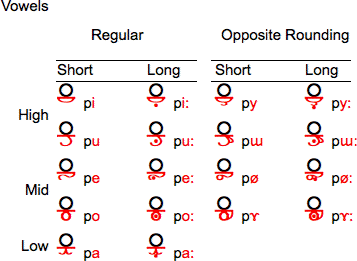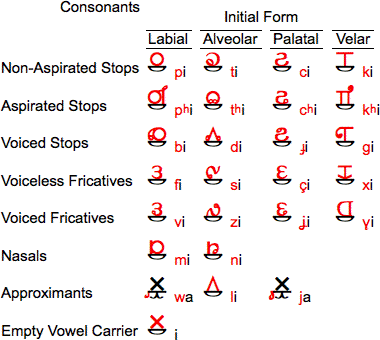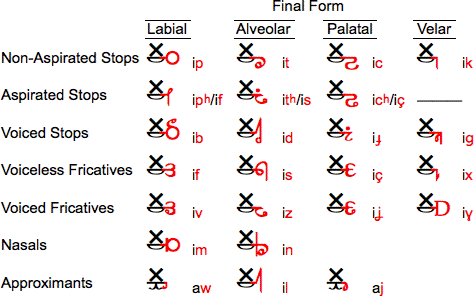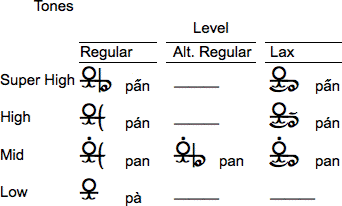Sheli Toj, which means "Sheli Writing System", is the name of the script used to write the Sheli language, created by David J. Peterson in 2001. Sheli is a fairly complex tone language with an inverse animacy system.

Vowels appear directly below the onset consonant character (vowels above shown with initial consonant /p/).
The empty vowel carrier is used for vowel-initial syllables. The approximants /j/ and /w/ are not full consonants, and can appear in conjunction with other onset consonants.


The aspirated consonants become voiceless fricatives in syllable- final position. The aspirated velar stop has disappeared in all but word-initial position in Sheli, and does not have a coda form.

A cêwtò: is a stroke below a vowel which indicates that the coda is a nasal homorganic to the coda stop, which is not pronounced. Whenever a cêwtò is used, the vowel becomes lax.

The codas /n/ and /s/ are older, historically, than the rest of the codas in Sheli. These special final forms are used in words where the coda /n/ and /s/ are old codas, and not old onsets.

Note that zap coda words occur only with high and mid tones.

![]()
![]()
Many years ago, the whole land had one language with a small number of words.
More information about Sheli Toj and the Sheli language
http://dedalvs.conlang.org/sheli/
If you have questions about this alphabet, you can contact David J. Peterson at dedalvs@gmail.com
Constructed scripts for: Ainu | Arabic | Chinese languages | Dutch | English | Hawaiian | Hungarian | Japanese | Korean | Lingala | Malay & Indonesian | Persian | Tagalog / Filipino | Russian | Sanskrit | Spanish | Taino | Turkish | Vietnamese | Welsh | Other natural languages | Colour-based scripts | Tactile scripts | Phonetic/universal scripts | Constructed scripts for constructed languages | Adaptations of existing alphabets | Fictional alphabets | Magical alphabets | A-Z index | How to submit a constructed script
[top]
You can support this site by Buying Me A Coffee, and if you like what you see on this page, you can use the buttons below to share it with people you know.

If you like this site and find it useful, you can support it by making a donation via PayPal or Patreon, or by contributing in other ways. Omniglot is how I make my living.
Note: all links on this site to Amazon.com, Amazon.co.uk
and Amazon.fr
are affiliate links. This means I earn a commission if you click on any of them and buy something. So by clicking on these links you can help to support this site.
[top]